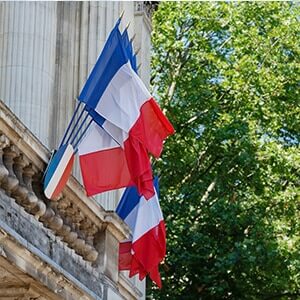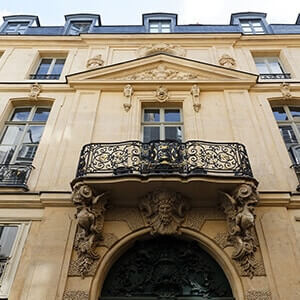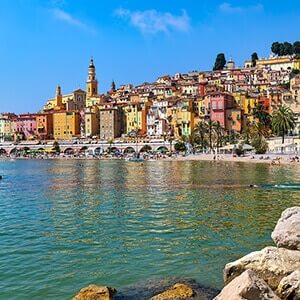Moving to France from the UK
With a combined total of 87 million residents, France is a truly desirable place to settle down in. There is no better life than one surrounded by fine wines, local bakeries, famous art galleries and magnifique architecture. There is plenty to do, see and consume when in France. Whether you decide to step into the thriving fashion industry in Paris or soak up the sun in Côte d’Azur, there are many locations across France which have growing expatriate communities.
If you’re looking to move to France from the United Kingdom, there is a lot you should know beforehand. We’ve put together the ultimate international relocation guide so that you can be prepared for your move to France.
Orientation
As the largest country in Western Europe, France has long been a dominant force in global and European affairs. France is bordered by 8 countries, making it a central hub in Europe. The Pyrenées Mountains stand between France and Spain, with the Alps dividing France from Italy in the southeast. The Rhine River forms most of the northeastern border with Germany, and France and Switzerland are separated by low mountain ranges.
French time is one hour ahead of Greenwich Mean Time (GMT) and is 6 hours ahead of US Eastern Time. Find out about the current time in Paris.
Learning the language
The French take great pride in their country and culture, which was initially influenced by Celtic and Gallo-Roman cultures. The French appreciate anybody who tries to integrate with the community and learn the language.
If you’re planning on moving to France, it’s always a good idea to try learning the language. A little French will go a long way in business and everyday situations. Whilst the French don’t expect newcomers to master the language immediately, showing your interest in the language is a simple courtesy and will be greatly appreciated.
Watching French television, listening to podcasts and even music can help improve your language skills, however, taking short courses or lessons is always recommended. A great course to take in France is offered by France Langue, which is offered in Biarritz, Bordeaux, Lyon, Nice and Paris. There are a number of courses you can take, for example, lessons on professional French are available and can be of use to businesspeople. Conversational groups also offer social interaction to help improve your French language.

Passports, Visas and Permits
If you’re moving with business, employers tend to provide passport, visa and permit assistance to expatriate employees, whether in-house or through an external vendor. It is important to take advantage of this support, to ensure that you and your company comply with laws and regulations. From the UK, this process shouldn’t be too difficult as the two countries are such close neighbours. However, Brexit means there are further implications than in place previously, so your HR department will need to do further research to ensure you remain compliant.
Passports – Every member of your family should have a passport of their own, which is valid for longer than your intended stay in France.
Visas – A visa is an authorisation by another country’s government which permits someone to enter a different country for a certain purpose. This is often stamped on the passport. Employers can provide assistance or take responsibility for your visa or permit, and you are strongly advised to seek expert advice about obtaining one.
Learn more about obtaining passports, visas and permits for France on the French Visa website.
Moving to France After Brexit
If you’re planning to move to France from the UK, you probably have questions about Brexit. This is crucial to consider when sending employees to France from Britain, as there will be a considerable number of administrative hoops to jump through following our exit from the European Union. You can still live in France after Brexit but you will need to apply for a long–stay visa, followed by an application for French Residency if you plan on staying for longer than a year. You will need to apply for a Carte de Sejour as well as a Multi–Year residency permit, which will allow you to live and work in France for up to 4 years at a time.
Customs Requirements
Household and personal goods can be shipped to France from any other country within the European Union, although an inventory list of all items must be provided. If you currently live outside of the EU, your belongings are allowed to be moved but only if they have been owned for at least six months. VAT must be paid on items owned for less time than this. You have up to 12 months to complete the shipment of your personal goods, so bear this in mind for employees heading over the channel.

Prohibited and Restricted Items
There are some items which are either restricted or prohibited to be taken into France, falling under the following categories:
- Animal products
- Plants
- Wild fauna and flora
- Live animals
- Medicine
- Firearms
- Military goods
- Art and collectors’ items
Prescribed medication, camera equipment, film, jewellery and tobacco are not permitted in unaccompanied baggage without a permit. Consult your closest French embassy if you have any questions or require further assistance.
There are some items which are strictly prohibited from entering France:
- Meat from Africa
- +1 kg of animal products
- +2 kg of salt or freshwater products
- +5 kg of vegetable products
- Illegal drugs
- Pirated editions of copyrighted works
- Mercury thermometers
- Firearms and explosives
Taking a Pet to France
Whether moving to France or planning a temporary relocation, you might worry about whether it’s permitted for your pets to join you. If you’ve watched any kind of movie featuring France, you will know that the French, particularly the Parisians, are very fond of dogs. Dogs are welcomed in many social situations, with some allowed in restaurants, public transport and sometimes even taxis. If you decide to travel with your dog on the train, you will have to pay a small fee to do so. Your pet should be carried in a basket as well.
Pets from outside the EU
Dogs, cats and ferrets arriving in France from outside the EU require the following:
- Microchipping
- Vaccinations
- Pet passport
- Tapeworm treatment certification (for dogs)
- Negative rabies test certificate
Pets from inside the EU
Pets arriving in France outside of the EU may be subject to quarantine if they do not have a valid EU pet passport. See below the requirements:
- Implanted microchip
- Rabies vaccination and proof
- Health certificate
When planning on transporting your pet, it is essential that their information is up to date. Contact your local French embassy if you require further assistance.
Taking a vehicle to France
Many people moving abroad question whether a car will be needed in their new country of residence, and the answer entirely depends on where you choose to live and your individual requirements. If a car is necessary for your stay, you may find that a car made in France is more convenient, as it is much easier to obtain spare parts. It may also be more cost-efficient.
If you have a vehicle you wish to transport, you can import it considering it has been owned by you for over six months. You will be asked to show proof of unlimited third-party liability insurance. You will also be required to apply for your vehicle’s registration, and a French licence plate and ensure your car is suitable with regulations. Get in touch with your manufacturer before deciding to bring the vehicle, as modifications to your car can be expensive.
Finances
The euro is the official currency of France. The physical currency is made up of seven notes, €5, €10, €20, €50, €100, €200 and €500. There are also eight coins, 1 and 2 Euros and 1, 2,5, 10, 20 and 50 cents.
The French central bank is Banque de France. There is a great selection of retail banks in major French cities, which offer a full range of personal local banking services. There are some banks in France which apply an additional charge for online banking, so be sure to research the best bank to suit your needs. Take a look at a list of banks in France for more information.
It is easy to exchange currency into Euros, visit our Gerson FX currency services page where you can get a free currency exchange quotation.
Buying a Home in France
There are no specific regulations currently in place that prevent foreign nationals from purchasing a property in France. When buying a home there are a couple of costs to be aware of. Firstly, you are responsible for all notaire and estate agent fees, which can total up to 15% of the full purchase price. Secondly, there is a capital gains tax which can be applied up to one–third of any profit you make on the sale of a home.

Renting a Home in France
Most expats opt for renting in France, as opposed to buying. This option is easier and is much more flexible, making it the perfect choice for those staying on both long or short term basis. Not only is it easier and more flexible, it also allows you to check out living in the best areas of France before you commit to one. If you are renting in France, find out whether the owner of the building you’re looking at is an individual or a business. You can then ask if there will be any construction during your stay as if you have children or wish to open the windows, this can be a problem. It is also a good idea to ask about additional living and storage space, for example, a basement that could serve as an office. Ensuring parking is available is also wise.
Driving in France
Holders of EU driver’s licences are allowed to drive in France, however, those that are outside of the EU are only allowed to use their home country licence for up to one year. It is important to keep a translated copy of your driver’s licence with you at all times. When you are ready to get a French driving licence, you must take a knowledge and road test, similar to the UK process.
A modern highway network runs through France, with Paris being circled by two limited access ring roads. These are heavily used and can overflow with traffic, especially during rush hours. There is a coordinated system of high-speed toll routes, which are called autoroutes. On long trips, the cumulative cost of tolls can dent your wallet, so avoid these routes if possible.
We would also recommend purchasing a Rules of the Road book. Reading this will help you to become more familiar with French driving regulations. Here are a few regulations that you should be aware of before driving in France:
- All passengers must wear a seatbelt
- Children under 10 must sit in the back
- Cell phones cannot be used while driving, which includes headsets
The French also drive on the right–hand side of the road and give the right of way to drivers on the right.
When driving in France, you must have unlimited third-party liability insurance. You must display the vignette d’assurance – insurance certificate – on your windshield, as well as obtain a ‘green card’ for when driving outside of France.
The Expatriate Community in France
There is a strong, diverse expat community in France. France has a wealth of well-established expat clubs to join, where like–minded people can share hobbies, and charitable endeavours, and exchange conversation. The French can be private in their nature, with relations being fairly reserved. Despite this, foreigners make many friends when living in France, especially when an effort is made to mingle with the local community. Learning some basic French can also help you make acquaintances there. Language training services for your employees prior to their relocation can make a world of difference to their time in France.
Social life in France mostly revolves around food, whether you’re cooking it, eating it or sharing it with family and friends. Meeting socially and attending formal meals are popular pastimes in France, both in homes and in restaurants. Well known for fine delicacies such as wine and cheese, you will never be short of a nice eatery to meet new faces.

Religion in France
Church attendance in France is fairly low compared to other countries, however, services are still available for anyone who wishes to go. Many denominations have services in English, especially in major cities. Places of worship represent all major religions, such as Protestant, Catholic, Jewish and more.
Take a look at local websites to learn more about services in specific areas and neighbourhoods.
Social customs in France
There are countless aspects to fitting in and acclimatising to a new place. In terms of everyday life, it’ll take time to note every new aspect of culture and customs, but the basics are a great place to start. With the following details, you’ll slip more easily into French life.
Greetings, titles and names
The French are known to shake hands at every meeting, with the man waiting until offered a woman’s hand. It is fairly unusual for people to exchange cheek kisses or hugs, however this entirely depends on the region. People in France are also typically addressed in French as “Monsieur” or “Madame,” with the title but without the surname.
Alcohol and Drinking
France is famous for its fine wines and is the cornerstone of the French dining experience. The French enjoy wine with meals, and favour it over hard liquor, as they consider the wine to aid digestion and appetite. When being entertained, the host will serve everyone and propose a toast, so wait a moment before drinking. The host will also replenish your glass throughout the meal.
Please note, the legal drinking age in France is 18 years old.
Tipping
Tipping is a common practice in many European countries. In France, service charges are sometimes included in the bill, as marked with “SC” meaning Service Compris. If your bill reads “d’appreciation du client”, this essentially means that it is up to you whether you tip or not. If you do wish to tip your server, 10-15% of your total bill is seen as a good amount.
Gestures and body language
Body language can take time to nail in a new environment, as each country will have their unique tendencies. There is a slight lack of physical contact when the French are talking, however, it does tend to happen more frequently among good friends. Here are the gestures and body language that are appropriate and inappropriate in France:
Appropriate
- Thumbs up – This means “okay”
- Circle sign – This means “zero”
- A hand cupped behind the ear – This means “Can you repeat?”
Inappropriate
- Intense eye contact/staring
- Putting hands in pocket
- Slapping a closed fist with an open palm
Etiquette
There are a number of etiquette ‘rules’ which are followed by the French. When attending a social gathering, guests typically arrive 15 minutes later than the prompted time, offering appropriate host/hostess gifts. Avoid chrysanthemums, as these are perceived as funeral flowers.
When in France it is important to be polite and courteous, as you would in any other country. Greet shopkeepers when entering a shop with “Excusez-moi”, and always use “merci beaucoup” to thank them.
Are you looking to relocate your employees to France? Discover our Global Mobility services, designed to support your international employee moves.
Interested in information on another country? Take a look at our other International Relocation guides.
Great Customer Experiences start here
Very pleasent and helpful. Nothing too much trouble.
Mr M H moved from London, UK to Toronto, Canada
Very helpful and patient even when things got packed that we had to get out again!
Mr M E moved from Enfield, UK to Dorset, UK
Thanks to Graham, Nick and the entire crew!
Mr C D M moved from UK to Singapore
Friendly and helpful crew.
Ms T W moved from USA to Cambridgeshire, UK
